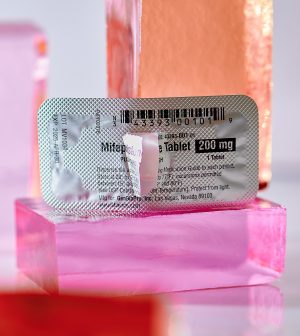- Could Your Grocery Store Meat Be Causing Recurring UTIs?
- Are You Making This Expensive Thermostat Error This Winter?
- Recognizing the Signs of Hypothyroidism
- 10 Strategies to Overcome Insomnia
- Could Artificial Sweeteners Be Aging the Brain Faster?
- Techniques for Soothing Your Nervous System
- Does the Water in Your House Smell Funny? Here’s Why
- Can a Daily Dose of Apple Cider Vinegar Actually Aid Weight Loss?
- 6 Health Beverages That Can Actually Spike Your Blood Sugar
- Treatment Options for Social Anxiety Disorder
Telehealth as Safe as Clinics for Abortion Pills, Study Finds

Medication abortion can be delivered safely and effectively using telemedicine, a large, new study concludes.
Women who received abortion pills through the mail following a video visit with a doctor fared just as well as women who visited a clinic, researchers report Feb. 15 in the journal Nature Medicine.
There were virtually no serious adverse events, with the medication proving safe 99.8% of the time, researchers found. Further, the women did not require follow-up care 98% of the time.
Those numbers are similar to the experience of patients who receive abortion pills following an in-person visit to a clinic or doctor’s office.
These findings come as the U.S. Supreme Court prepares to weigh whether the U.S. Food and Drug Administration acted correctly in broadening its policies to allow one commonly used abortion pill, mifepristone, to be prescribed through telehealth.
“This research confirms that the FDA followed science in allowing patients to get medication abortion through telehealth and the mail,” said lead researcher Ushma Upadhyay, a public health scientist with Advancing New Standards in Reproductive Health at the University of California, San Francisco.
“Our findings make it abundantly clear that the case at the Supreme Court is simply an attempt to restrict access to abortion care, even in those states where it’s legal,” Upadhyay added in a university news release.
Medication abortion now accounts for more than half of all abortions, researchers said in background notes.
It involves taking two pills, mifepristone followed by misoprostol.
Demand for the pills has skyrocketed since more than two dozen states banned or restricted abortion following the Supreme Court’s overturning of Roe v. Wade in June 2022, researchers said.
One U.S. online provider of the abortion pill combo saw a ten-fold jump in orders when news of the pending Roe v. Wade decision first leaked in 2022, according to a recent report in the journal JAMA Internal Medicine.
For the new study, researchers analyzed data from more than 6,000 patients who obtained abortion pills from virtual clinics in 20 states and Washington, D.C. between April 2021 and January 2022.
Researchers also compared video visits to secure text messaging and found that they were equally safe and effective.
They concluded that telehealth protects patient privacy while making abortion more accessible.
“Since the COVID-19 pandemic, telemedicine has become the new frontier in health care, including for medication abortion,” Upadhyay said. “A ruling against this method and the FDA’s rigorous science review process would be a huge blow to the American public and make this essential health service harder to get.”
More information
The Association of American Medical Colleges has more about medication abortion.
SOURCE: University of California, San Francisco, news release, Feb. 15, 2024
Source: HealthDay
Copyright © 2026 HealthDay. All rights reserved.










